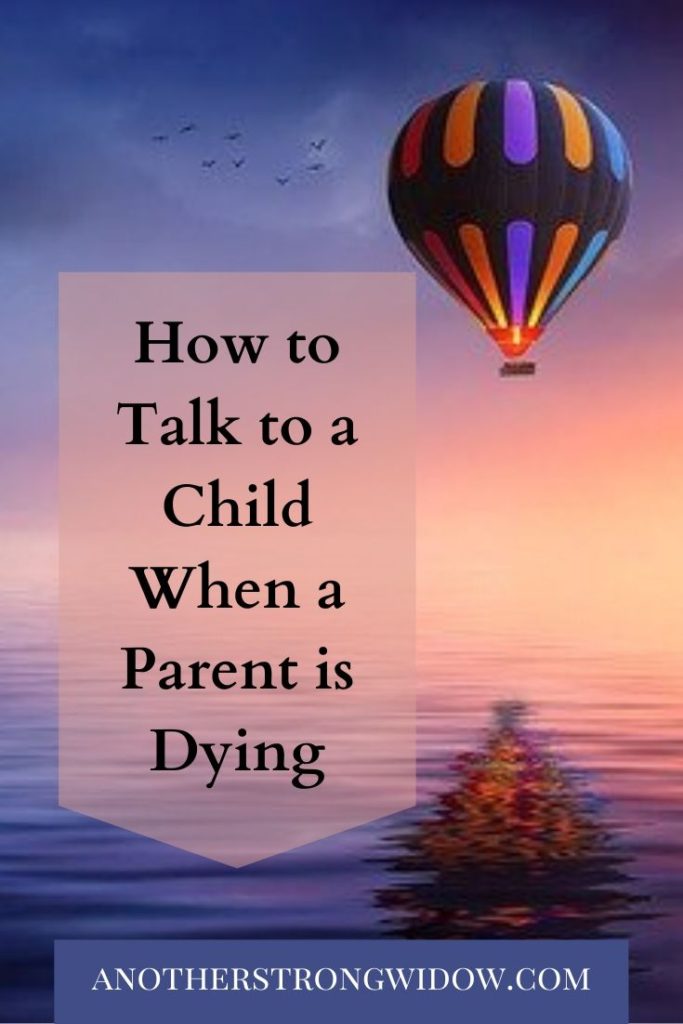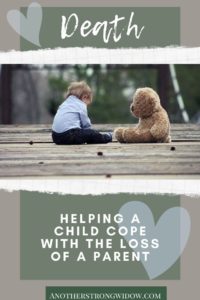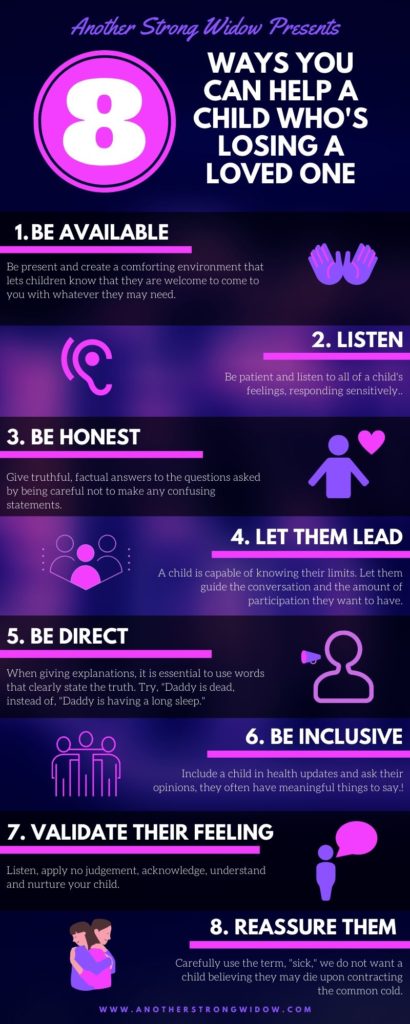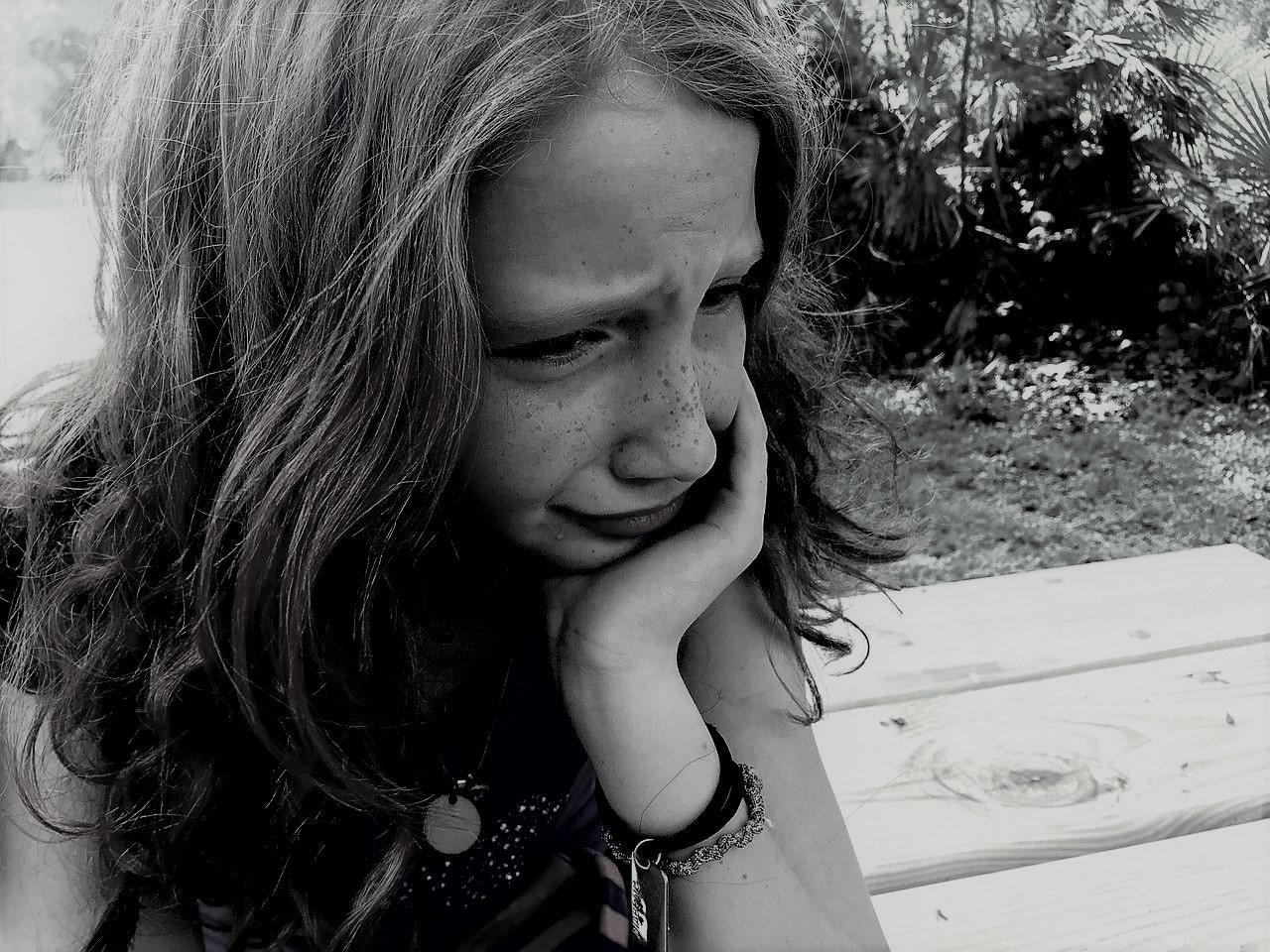When a parent or loved one is dying, it can be hard to know what to say to your child and how to say it. I have spent a lot of time recounting the final days of my husband’s life.
It is easy to regret decisions that were made as I scrutinize all of the could-haves, should-haves, and what-ifs, over Chris’ life. Without a doubt, one aspect of the past events that I hold complete confidence over is how I handled my children.
We arrived at the hospital, far from home, in the middle of the night, Chris by ambulance and I followed with the kids. After Chris was relocated from the emergency department to the intensive care unit, I was given the adjacent ICU room to settle my children. A gracious act to a struggling mother.
My children needed a place to sleep, so with a hospital bed and a stretcher pressed together and the wheels locked, I calmed and snuggled each of them to sleep. It was approaching morning but, I didn’t sleep, I lay there straddling the crack between the two beds providing different body parts to each child in need. Protecting them madly, I watched over them, ready to provide comfort instantly if needed.
This was the beginning of thirteen days between parenting my children and attending my husband in the intensive care unit while away from home. Below is what I have learned through my experience.

| 1. Be Available | 5. Be Direct |
| 2. Listen | 6. Be Inclusive |
| 3. Be Honest | 7. Validate Their Feelings |
| 4. Let them Lead | 8. Reassure Them |
In my case, there was not a jointly held opinion among the hospital staff regarding bringing children into the ICU. Some people were supportive, while others held strong views about not having the children visit, suggesting that it would be too much for them to handle. I had one professional tell me absolutely not, it would scare them and was unnecessary. I know now that she was wrong.
My fear of taking my children to Chris’ bedside to visit was that it would provide them with lasting memories of the way that their father looked. We make assumptions for the child, that these are bad and scary images to them.
We try to safeguard our children, shield them from death, and exclude them from a natural process instead of teaching them about it.
I do not agree that we should withhold information or exclude our children because we are fearful of upsetting them or worrying them.
1. Be Available
The first few days Chris was in the hospital, my son, Lewis would avoid me, he would run each morning when I tried to speak to him. He acted like he was angry with me, and I felt like he believed that I had sent his father away from him.
I would return from the hospital late at night, often 11 or 12 o’clock and my 3 and a half-year-old would still be awake awaiting my arrival. I would lay with him for as long as he wanted, applying no pressure for him to go to sleep, and being sure to allow him time to ask questions at his leisure.
2. Listen
Be patient, it was approximately the fifth night laying with Lewis that the flood gates of “why” opened. Lewis had many questions that led me to realize he did not have an understanding of where his father was despite me telling him.
The last time Lewis had seen his father, he was taken away in an ambulance, in the dark, on the side of the highway, after a series of horrifying events.
3. Be Honest
Every question that Lewis asks, I answer. I answer in the most transparent way I know-how. Since he has opened up and has become more comfortable, I ask him if he would like to see Daddy, and he says yes. I let Lewis lead, and we have a conversation about what Daddy is doing and what he looks like.
“Do you know what breathing is? Take a deep breath, the air goes inside of you and into your lungs, let’s do it together. Now breathe out, do you feel that? The air is coming back out of your lungs.”
“Daddy was breathing too quickly, so he has been given medicine to relax him and let him sleep. He is breathing on his own, but sometimes his body is so relaxed it forgets to take a breath, so he has a machine to help him just in case.”
4. Let them Lead
The next morning Lewis declined to come to the hospital, he wasn’t ready, and I had no intention of pressuring him. The choice was entirely on Lewis, and if he chose not to come at all then, that was ok too. It was obviously heavy on his mind as each morning, without prompting, he would reconsider his choice and tell me that he would come with me the next day.
After 4 more days of thinking, Lewis chose to come with me to visit Chris. I was unsure, and I hid my anxiousness, but as with most of my parenting choices, I let my instincts guide me.
The sight of Chris was painful for most adults that went into the room, but we perceive it differently than children. Neither Lewis or Georgia were bothered by the sight of their father. They asked questions about every button, tube, and machine as they sat with him, held his hand, and talked to him. When I left the room with them, I felt relief because I knew I had done the right thing.
Trust your child, trust yourself, follow your instincts
Before visiting Chris in the hospital, Lewis would become upset at the sight of an ambulance and ask if that’s where Daddy is. This trigger dissolved once he had a full visual understanding of the hospital. His little mind was desperately trying to make sense of the events that had happened and was connecting the dots into something possibly even worse than the reality.
I can relate to this, I was approximately 4 years in age when the fish tank in my grandparents’ basement was suddenly uninhabited. The information I was given led me to imagine the fish hopped out of their home, across the floor, and under the door crack leading to the garage. I spent years trying to fill in the last piece of my puzzle. How did the fish get beyond the garage door to freedom in their wild fish pond? What really happened to the fish is obvious now, but this is an example of how a child’s mind will construct events when they are not told the truth.
It is clear to me now that the sight of an intubated father, to my child, was less painful than the made-up answers he had created himself.

5. Be Direct
Don’t assume that a child doesn’t understand what death is and leave them to mourn alone. What they have interpreted is likely far different than what you believe they know.
The day that life supports were removed, the children visited with Chris and said their goodbyes. Hearing my two-year-old daughter say, “bye-bye Dada,” as I explained this would be the last time she saw him alive, is one of the most rotten experiences of my life.
After Chris passed away, I brought the children back into the hospital room to have a chance to see daddy again. My intention was for them to see him without the ventilator, but it also became a lesson about death.
I sat in a chair, I did not cry, and a dominant strength within me took over, I was in, “mom-mode,” doing everything I could to protect my children. There wasn’t a dry eye in the ICU, as I once again directly answered the most difficult questions.
“Daddy is dead now. All of the machines that have been keeping Daddy’s body working have been taken away. This is the last time that you will be seeing daddy. We will not be coming back to the hospital anymore, and Daddy will not be coming home.”
I remember two hospital staff members, trying to stay out of my gaze as they choked on their tears. The reactions of people, who are surrounded by death each day, was a validation I needed; this was indeed really really horrible.
Children take things very literally, and when we say things like, “Daddy is in your heart now,” this may be confusing. Instead, when they asked where Daddy was now, I told them the truth.
“Daddy is in a box, his body was turned into ashes by a very hot furnace, and we will be putting those ashes into the ocean by our house.” Together we looked at ashes in our backyard firepit; they were very curious to learn more and requested to see Daddy’s ashes. I wish I had the strength to show them and teach them more, but this is where my adult emotions took over, and I’m not ready.
6. Be Inclusive
I am thankful that I was truthful about the cremation process because it opened the lines of communication with my children. I now know that Lewis also has a meaningful spot where he would like to put some of Daddy. Because of this conversation, I plan to save some ashes for each of my three children. It taught me that I should have been inclusive of him from the start. All too often, grown-ups are busy making grown-up decisions and don’t acknowledge a child’s presence or that their opinions matter too.
7. Validate Their Feelings
This is something as parents, we can likely all work on. When you are tired, frustrated, and out of patience, it is so easy to say, “oh stop crying, you’re crying over nothing.” This is the opposite of validating feelings. Please listen, apply no judgement, acknowledge, understand and nurture your child.
I am now living with children who tell me every day that they want daddy to come back. My 2.5-year-old tells me regularly that she is sad, I don’t think that she fully understands the weight of her words, but I am happy that she is sharing with me. I try not to brush her off or snap with, “well, daddy isn’t coming back!” when I am under my own feelings of grief.
8. Reassure Them
When I speak with my children, I try to be aware of the language that I use, especially as we go into winter, when the word “sick” is used more frequently. I stress that Daddy had a rare disease, it’s not the same as the runny noses we get. I am still uncomfortable with the word cancer, but I try to say, “Daddy had cancer,” rather than, “Daddy got sick.”
I tell them that when I leave, I always come back, and I plan to take care of them for the rest of my life.
I am not a trained professional, and the opinions in this article are mine alone. They are based on my journey through an uncomfortable part of my life. I didn’t know what I should be doing at the time, but I do know that I look back at the events and feel proud of the way that I handled them. I hope that by sharing these experiences, you can find some guidance as you make your own difficult decisions.
I guided three children through the final days of my husband’s life and, I have zero regrets about the way that I did it.

Like the infographic? Pin it for later.




I am a “professional” and have been a child and family therapist and I highly commend you for your approach. The most important message I’m hearing is that you took each child’s personality, needs and stage to heart with your approach. You were so very present for them all while being present for your husband. Such big big work. You probably realize that as they mature, more processing occurs at each developmental level. I think that’s always helpful to remember in case there’s a tendency of, wait— haven’t we covered this already? Or if there’s concern that it’s being processed too much. Sorry, not meaning to be pushy, and you probably already knew this, but have witnessed this so many times when a parent hadn’t been prepared. Sending you compassion and pure awe for the unfathomable caregiving you so lovingly provided your family.
Thank you! I appreciate your feedback! I have already seen changes in my children, particularly my oldest. I recognize that we are just beginning on this journey of childhood grief and the difficulties ahead as they start to process all of this and the impact that it has on their lives. My son was quiet for a while, and now if frequently crying as little memories cross his mind (tonight it was “Dada cheese,” he is worried he forgets him).
This is beautiful. You are such an amazing mom. You were and are strong your for your children, you helped guide them and fostered learning and understanding when their father passed. I have so much awe at how you made the death of their father into something that won’t confuse them for the rest of their lives. Of course they are young and may not fully understand what happened or where daddy is, but I have no doubt they will remember forever how you handled the situation and allowed them to understand in their little minds what was happening in that moment.
Thank you for your kind and thoughtful words. It is amazing the strength you can find when you have no other choice and the instincts that kick in.
You are an incredible mom and person. Your children are so fortunate to have someone like you as their mother.
Thank you Lillian, your comment means a lot to me. Thank you for reading.